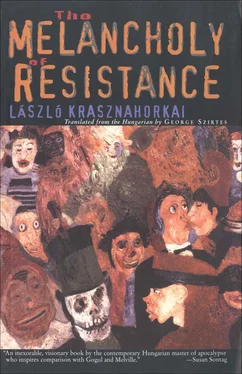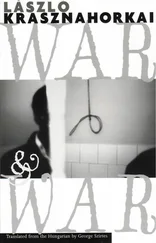him, and it became clear to her how, step by step, the ‘degenerate monster’ had interpreted her every action — her taking off her fur … the unfortunate accident … and her enquiring after the washroom — as an invitation, as solid proof of her compliance, in a word as the cheap blush-worthy stages of a low transaction, to the extent that she now had to cope with not only a disgraceful attack on her virtue and respectability but the fact that this filthy repulsive man, stinking of brandy, should address her as if she were some ‘woman of the streets’. The wounded fury which seized her proved even more painful to her than her sense of defencelessness, and — since, apart from anything else, she could no longer bear the entrapment — driven by desperation, in a voice choking with tension, she shouted to him: ‘Go away! Or I shall cry for help!’ On hearing this, after a short silence, the man struck the door with his fist and, in a voice so cold with contempt that shivers ran down Mrs Plauf’s back, he hissed at her: ‘Go screw yourself, you old whore. You’re not worth breaking down the door for. I wouldn’t even bother to drown you in the slop-pail.’ The lights of the county town pulsed through the window of the cabin, the train was clattering over points, and she had to stop herself falling over by grasping at the handrail. She heard the departing footsteps, the sharp slamming of the door from corridor to compartment, and, because she understood by this that the man had finally released her with the same colossal impudence as he had accosted her, her whole body trembled with emotion and she collapsed in tears. And while it was really only a matter of moments, it seemed to last an eternity, that in her hysterical sobbing and sense of desolation she saw, in a brief blinding instant, from a height, in the enormous dense darkness of night, through the lit window of the stalled train, as if in a matchbox, a little face, her face, lost, distorted, out of luck, looking out. For though she was sure that she had nothing more to fear from those dirty, ugly, bitter words, that she would be subject to no new insults, the thought of her escape filled her with as much anxiety as the thought of assault, since she had absolutely no idea — the effect of each of her actions so far being precisely the reverse of that calculated — what it was she owed her unexpected freedom to. She couldn’t bring herself to believe it was her choking desperate cry that frightened him off, since having felt a miserable victim of the man’s merciless desires throughout, she, by the same token, considered herself an innocent and unsuspecting victim of the entire hostile universe, against whose absolute chill — the thought flashed across her mind — there is no valid defence. It was as if the unshaven man had actually raped her. She swayed in the airless, urine-smelling booth, broken, tortured by the suspicion that she knew all there was to know, and under the spell of the formless, inconceivable, ever-shifting terror of having to seek some protection against this universal threat, she was aware only of an emerging sense of agonizing bitterness: for while she felt it was deeply unfair that she should be cast as an innocent victim rather than an untroubled survivor, she who ‘all her life had longed for peace, and never harmed a soul’, she was forced to concede that this was of little consequence: there was no authority to which she could appeal, no one to whom she might protest, and she could hardly hope that the forces of anarchy having once been loosed could afterwards be restrained. After so much gossip, so much terrifying rumour-mongering, she could now see for herself that ‘it was all going down the drain’, for she understood that while her own particular immediate danger was over, in ‘a world where such things happen’ the collapse into anarchy would inevitably follow. Outside she could already hear the impatient grumbling of passengers preparing to get off and the train was noticeably slowing down; realizing, panic-stricken, that she had left her fur coat wholly unguarded, she hastily unbolted the door, stepped out into the press of people (who, ignoring the fact that there was no point in it, engaged in the same storming of doors on the way out as they had on the way in) and, stumbling across suitcases and shopping bags, struggled back to her seat. The coat was still there but she didn’t immediately see the fake-fur wrap and while conducting a furious search and trying desperately to remember whether she had taken it with her into the washroom it suddenly dawned on her that in all that nervous excitement her assailant was nowhere to be seen: obviously, she thought, much assured, he must have been one of the first to leave the carriage. At this moment the train actually stopped but the briefly less stuffy, partially vacated, carriage was almost immediately overrun by an even larger, and, if possible, more frightening mass of bodies, more frightening because silent, and while it was easy to see that this dark huddle would give rise to equal anxiety over the remaining twenty kilometres, there was a still greater shock in store for her: if she had hoped to be rid of the unshaven man she was to be bitterly disappointed. Having gathered up her coat and finally located her wrap under the worn and shining seat, she gathered it about her shoulders and had, just for safety’s sake, set out to find another carriage in which to continue her journey, when — she could hardly believe her eyes — there was the very same broadcloth coat (‘As if he had left it there expressly for me to see!’) thrown carelessly across the back of a distant seat. She stoppped dead in her tracks, then hurried on, through the back door into the next carriage where she pushed her way through another silent mass of people to find another central rear-facing seat which, in desperation, she immediately occupied. For some time she kept her eyes fixed on the door, ready to leap up, though she no longer knew of whom she was most frightened, nor from what direction the danger was most likely to threaten, then, nothing untoward having happened (what with the train still standing in the station), she tried to gather her remaining strength so that should some awful adventure befall her she would at least be ready. Suddenly she felt infinitely tired, but though her weak legs were practically burning in the lining of her boots and her aching shoulders felt ‘ready to collapse’ she was unable to relax even a little, or only to the extent of slowly turning her head about to relieve the pain in her neck and reaching for her compact to cool her tearful flushed face. ‘It’s over, over, there’s nothing to be scared of now,’ she kept muttering to herself without believing it: for not only did she lack any such confidence, but she was unable even to lean back in her seat for greater comfort without increasing, as she thought, the risk of leaving herself unprepared. For the carriage was being occupied by a crowd ‘every bit as ugly as the first lot’ and not a whit less frightening than that at the start of her journey, so she could only hope that the three empty seats around her — the last empty seats — might act as some kind of defence and remain unoccupied. There was indeed some chance of that, at least for a while, because, for practically a whole minute (the train whistle blew twice in the interval), not a single new passenger entered the carriage; but suddenly, at the head of a new wave, loudly puffing and panting and carrying an enormous backpack and basket, balanced by a few well-filled shopping bags, a fat headscarved peasant woman appeared in the doorway, and turning her head this way and that way (‘Like a hen …’ it occurred to Mrs Plauf), took a decisive step towards her and, grunting and croaking with an aggression that brooked no argument, proceeded to colonize all three seats with her endless baggage which formed a barricade for her as well as Mrs Plauf from the throng of contemptible (or so her expression suggested) travellers behind her.
Читать дальше












